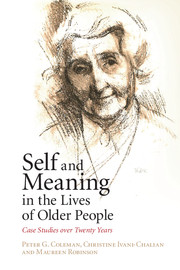Book contents
- Frontmatter
- Dedication
- Contents
- Preface and acknowledgements
- 1 Living a long life – why survive?
- 2 From self-esteem to meaning – studying psychological well-being in later life
- 3 Investigating older people's lives at the end of the twentieth century
- 4 Ageing together
- 5 Adaptation to loss of spouse
- 6 Ageing alone
- 7 Women becoming frailer
- 8 Men becoming frailer
- 9 Towards one hundred years
- 10 The future of later life: personal and policy perspectives on ageing and meaning
- Appendix: Participant characteristics
- References
- Index
7 - Women becoming frailer
Published online by Cambridge University Press: 05 May 2015
- Frontmatter
- Dedication
- Contents
- Preface and acknowledgements
- 1 Living a long life – why survive?
- 2 From self-esteem to meaning – studying psychological well-being in later life
- 3 Investigating older people's lives at the end of the twentieth century
- 4 Ageing together
- 5 Adaptation to loss of spouse
- 6 Ageing alone
- 7 Women becoming frailer
- 8 Men becoming frailer
- 9 Towards one hundred years
- 10 The future of later life: personal and policy perspectives on ageing and meaning
- Appendix: Participant characteristics
- References
- Index
Summary
Becoming frailer is central to the meaning of ageing. Whereas the presence of disability can be lifelong but also unchanging, the essence of frailty is fragility, a liability to further deterioration. A person who becomes frail is more vulnerable to illness and sudden death. There is a sense of being constantly at risk, of encountering a serious accident or fatal change in bodily condition, whether through incurring infection, becoming weaker or remaining too long in life-threatening conditions of exposure and isolation. Disabled persons and those around them can adapt more easily to a stable situation of need, but frailty requires a different type of adjustment. Regular or constant monitoring often becomes necessary.
Frailty is of course a relative matter, as is the need of personal monitoring. We are all vulnerable to gradual or sudden changes in bodily, environmental or social conditions, and in modern societies, we have become even more dependent on others to provide certain essential daily services for us. But there comes a point in most people's later years when the probability of damaging change occurring increases, particularly because of a decline in physical and mental abilities. Various negative outcomes become more likely: injury as a result of falling, weakness from failing to maintain adequate nutrition and inability to manage the household, competently carry out personal care tasks or move outside the house safely without fear of hurt or becoming lost.
In this and the following chapter, we consider the lives of those members of our sample from the time in our study that they began to become noticeably frailer. This usually implied that their continuing survival and welfare was dependent on the support provided by other people, generally their spouse or child(ren) (or both), and in some cases social care services. In fact, most of our sample became very frail before they died, if only in the last weeks or months of their lives.
- Type
- Chapter
- Information
- Self and Meaning in the Lives of Older PeopleCase Studies over Twenty Years, pp. 128 - 169Publisher: Cambridge University PressPrint publication year: 2015



